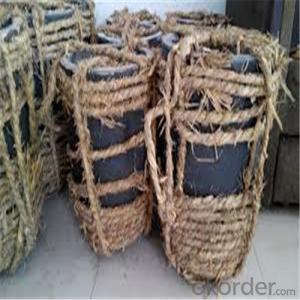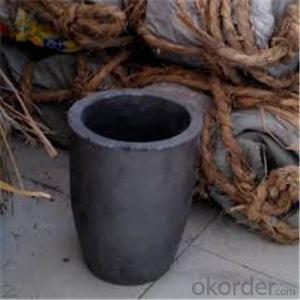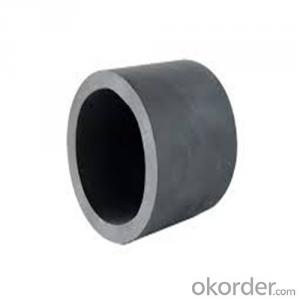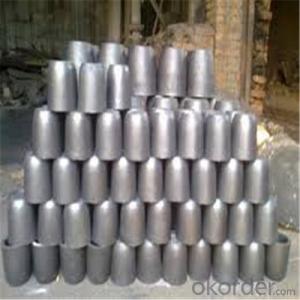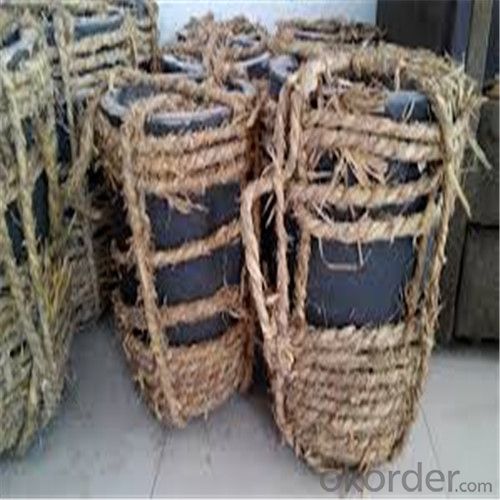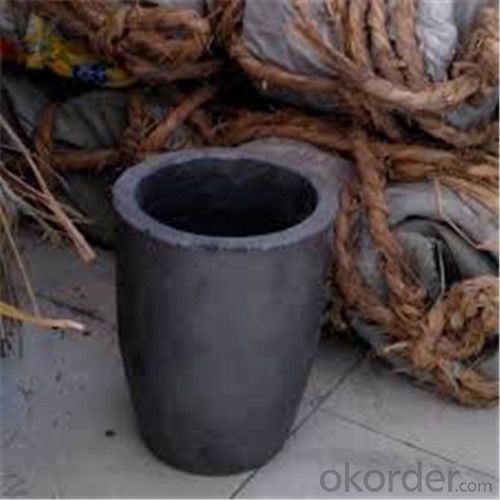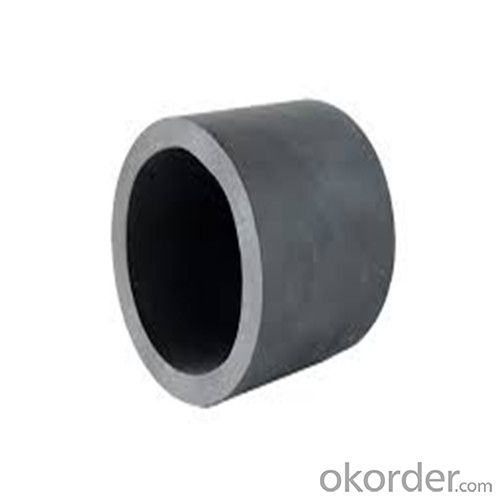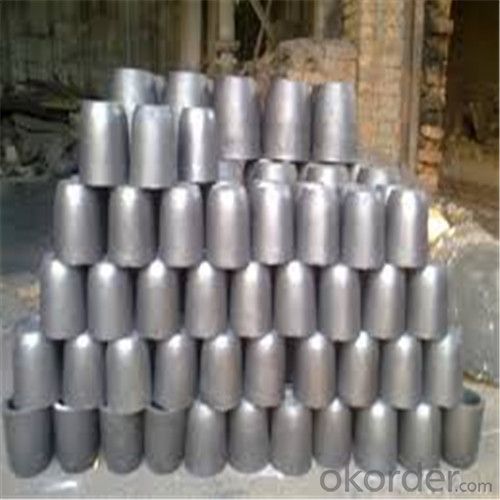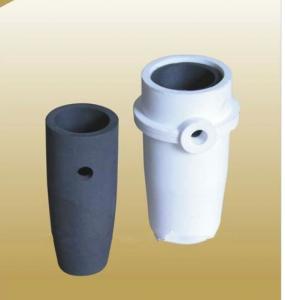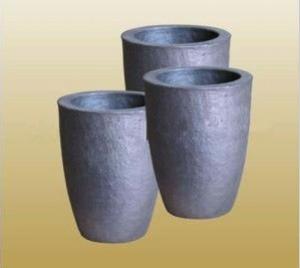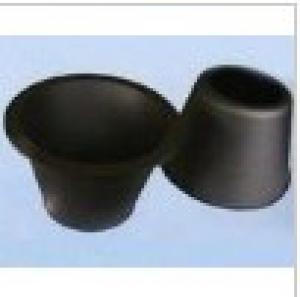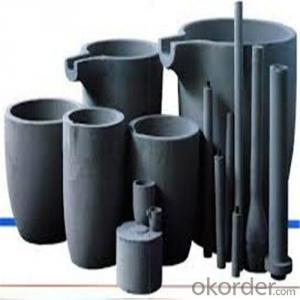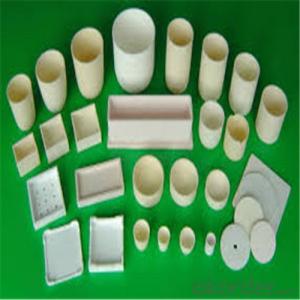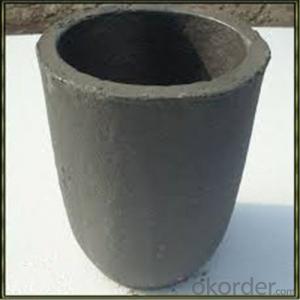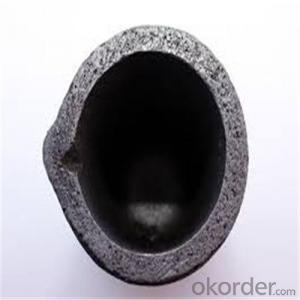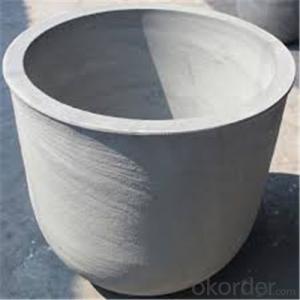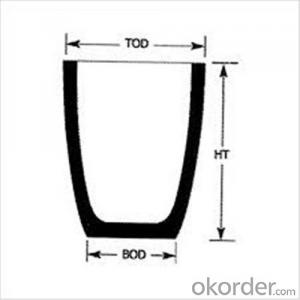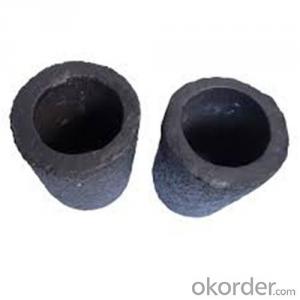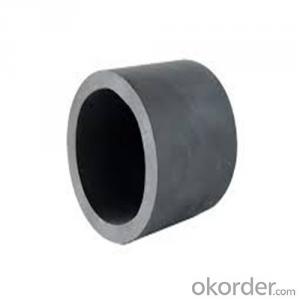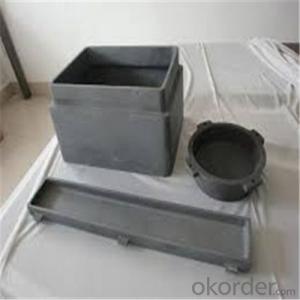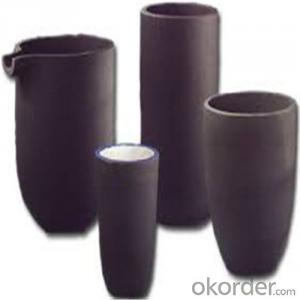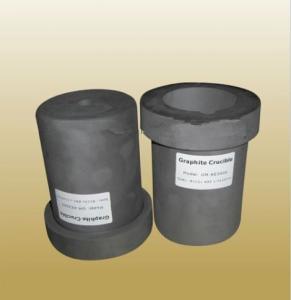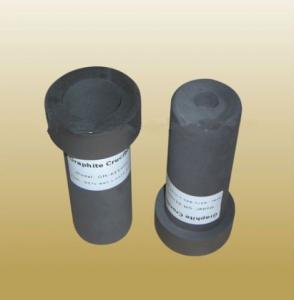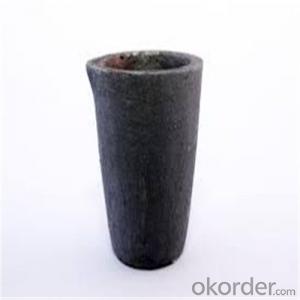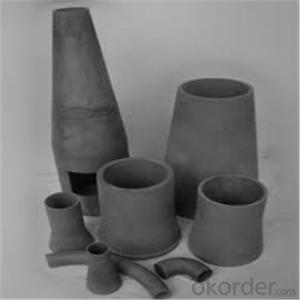High-Quality Graphite Crucible for Sale - SIC Melting Metal Crucible
- Loading Port:
- Shanghai
- Payment Terms:
- TT OR LC
- Min Order Qty:
- 1 pc
- Supply Capability:
- 1000 pc/month
OKorder Service Pledge
OKorder Financial Service
You Might Also Like
Quick Details
| Application: | melting metals | Height: | depends on your requirement | Top Diameter: | 10-1200mm |
| Bottom Diameter: | 10-1200mm | Place of Origin: | China (Mainland) | Brand Name: | |
| product name: | SiC graphite crucible china graphite crucible | top diameter: | 10-1200mm | bottom diameter: | 10-1200mm |
| height: | depends on your requirement | application: | melting gold,silver and other metals | Specific resistance: | ≤14μΩ.m |
| Bending strength: | ≥25MPa | Compressive strength: | ≥50MPa | Bulk densit: | ≥1.68g/cm3 |
| Ash content: | ≤0.15% |
Packaging & Delivery
| Packaging Details: | woden case for SiC graphite crucible china graphite crucible |
| Delivery Detail: | within 20 days |
Introduction
1. Graphite crucible can be used for non-ferrous metal smelting and casting, dissolving gold
or silver ornaments, analysis of special type steel, sintering hard metal.
2. graphite crucible for smelting gold is specialized in melting gold in headgear and jewelryindustry. That requests graphite material has high density and purity, ablation-resistance, and it can be used many times. We can machine various crucibles accordingto customer's requirement.
3. Machined from high pure graphite and widely used in the gold,silver,platinum and other noble metal's melting.If it's used in oxygen atmosphere,it wil start to be oxygenized when the temperature is higher than 700-800°c. If it's used in the protective atmosphere, it can stand more than 2000°c.
4. widely used in such fields as industrial furnaces, mono-crystalline silicon machinery, mono-crystalline silicon machinery, electron, semi-conductor, metallurgy, oil, chemistry, textile, electrical machinery, electrical equipment, electrical furnace, traffic, communication industry, medicine, etc.
Advantages
1.good thermal conductivity
2.High-temperature resistance
3. Small thermal expansion coefficient.
4.Strong corrosion resistance to acid and alkali liquid
5.Good chemical stability
Technology parameter
Item | Unit | High pure graphite | ||
baked twice | baked three time | baked four times | ||
impregnated once | impregnated twice | impregnated three times | ||
Grain size | mm | ≤325mesh | ≤325mesh | ≤325mesh |
Bulk density | g/cm3 | ≥1.68 | ≥1.78 | ≥1.85 |
Specific resistance | μΩ.m | ≤14 | ≤14 | ≤13 |
Bending strength | MPa | ≥25 | ≥40 | ≥45 |
Compressive strength | MPa | ≥50 | ≥60 | ≥65 |
Ash content | % | ≤0.15 | ≤0.1 | ≤0.05 |
We accept small orders,please inquiry us freely. | ||||
Item | Unit | Fine-grain Specialty Graphite model 1 | Fine-grain Specialty Graphite model model2 | ||
Guarantee value | Typical value | Guarantee value | Typical value | ||
Max grain size | mm | 0.8 | 0.8 | 0.8 | 0.8 |
Bulk density | g/cm3 | ≥1.70 | 1.73 | ≥1.73 | 1.76 |
Specific resistance | μΩ.m | ≤8.5 | 7.5 | ≤8.0 | 7 |
Bending strength | MPa | ≥10.0 | 11 | ≥12.0 | 12.5 |
Compressive strength | MPa | ≥24.0 | 27 | ≥31.0 | 34 |
Thermal Condcutivity | W/(m.k) | ≥120 | 150 | ≥130 | 160 |
C.T.E.(100-600) °C | 10-6/°C | ≤2.5 | 2.2 | ≤2.5 | 2.1 |
Ash content | % | ≤0.3 | 0.09 | ≤0.3 | 0.09 |
We are always avliable to service you! | |||||
Parts sizes of graphite crucible table
Product name | Dimensions(mm) | Weight(g) | |||
Φ1 | Φ2 | Φ3 | H | ||
1 kg graphite crucible | 58 | 47 | 35 | 88 | 160 |
2kg graphite crucible
| 65 | 58 | 44 | 110 | 240 |
2.5kg graphite crucible
| 65 | 58 | 44 | 126 | 300 |
3kg graphite crucible
| 85 | 75 | 60 | 105 | 390 |
4kg graphite crucible
| 85 | 75 | 60 | 130 | 500 |
4kg graphite crucible
| 85 | 75 | 60 | 136 | 500 |
5kg graphite crucible
| 100 | 89 | 69 | 130 | 700 |
5.5kg graphite crucible
| 105 | 90 | 70 | 156 | 800 |
6kg graphite crucible
| 110 | 97 | 79 | 174 | 970 |
We have all kinds of sizes graphite crucibles in stock,please feel free to contact us. | |||||
packaging & shipping
Packaging
1. For each type, we can send you the detailed high-resolution pictures since we have the sample in our hand.
2. For packaging, we have the professional packaging starff, pls. don't worry about the shipping.
Our service
1.Delivery time is 5~7 days for sample and 15 working days for bulk order;
2. Strong production capacity and strict quality control system;
3. Your inquiry and problems related to our products or prices will be replied in 24 hours;
4. Well-trained and experienced staffs to answer all your inquires;
5. After-sale tracking service for all of our clients;
6. OEM is available; small quantities, mixed bulk orders are also welcome;
7. Payment: L/C, D/A, D/P, T/T, Paypal , Western Union, MoneyGram;
8. Delivery way: UPS, DHL, TNT, FEDEX, EMS, CHINA POST.
After-Sales Service
1.1year warranty for most of our products;
2.We will arrange delivery of the goods on time:
3.Within the warranty period, we will bear all the qulity problem of our produts;
4.Beyond the warranty period, we will despatch the replacement parts to help fix the products;
5.Without any problem, we will gain the feedbacks of our products to help improve better products.
FAQ
Q:How to get in touch with us?
A:You can clik "Contact Supplier" above, or click "Chat Now!". We provide 24-hour service!
Q: How can I get free samples?
A: Only carbon brush for power tools/automobiles/motorcycle----no more than 4 sets for each model is free of charge.
Q:How to order?
A:Quotation→Price comfirming→Sign a contract→Mass production→Delivery
Q:How to pay?
A:30% T/T deposit.→70% balance by T/T against B/L copy.
Q:How to get after-sales service?
A:You can contact with your appointed sales.
You can also get in touch with our Quality Assurance Department: zdatzddt.com
Company Information
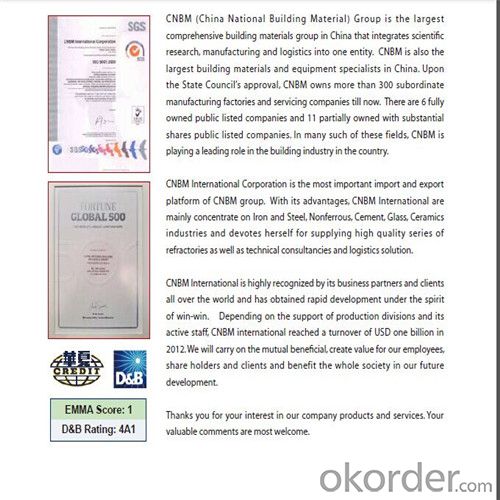
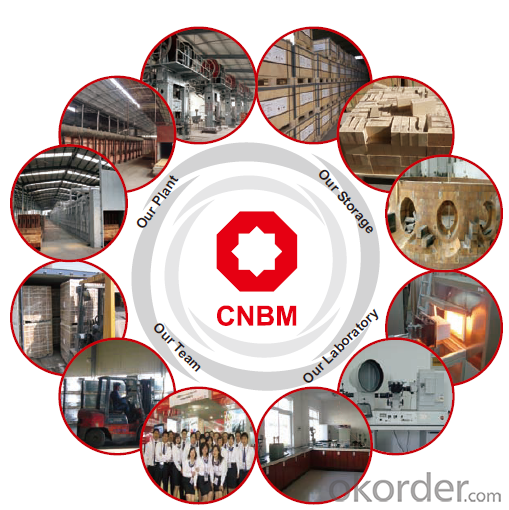
Other refractory materials for High temperature industry
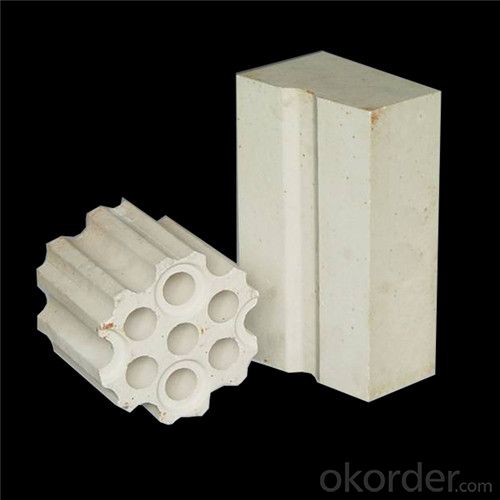
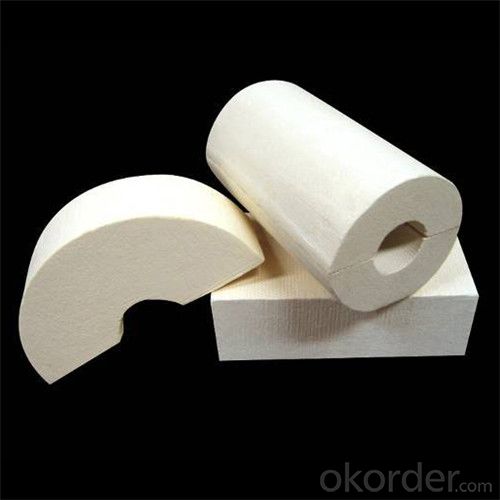
- Q: Are graphite crucibles suitable for melting composite propellants?
- Graphite crucibles are generally not suitable for melting composite propellants. Composite propellants consist of a mixture of oxidizers, fuels, and binders, which can be highly reactive and corrosive. Graphite, although known for its high melting point and resistance to high temperatures, can react with certain components of composite propellants. Graphite crucibles can undergo chemical reactions and erosion when exposed to certain oxidizers, such as ammonium perchlorate, which is commonly used in composite propellants. This can lead to contamination of the propellant and affect its performance. Additionally, the binders used in composite propellants can also react with graphite, leading to degradation and potential failure of the crucible. For melting composite propellants, it is recommended to use crucibles made of materials specifically designed for this purpose, such as ceramic or refractory metal crucibles. These materials have better resistance to the corrosive nature of composite propellants and can withstand the high temperatures involved in the melting process.
- Q: How to reduce the degree of oxidation of graphite when sintering at high temperature?
- (1) reasonable furnace geometry and feeding order;
- Q: What are the different methods of preventing oxidation in a graphite crucible?
- There are various techniques available to prevent oxidation in a graphite crucible. 1. Coating: An effective approach involves the application of a protective coating on the inner surface of the crucible. This coating acts as a barrier, preventing direct contact between the crucible and the oxidizing atmosphere. Refractory materials like zirconium oxide or alumina are commonly used for this purpose. 2. Preheating: Another method that works well is preheating the crucible prior to use. Subjecting the graphite crucible to high temperatures helps eliminate any impurities or volatile substances present, leaving behind a more stable and less vulnerable surface. This aids in minimizing oxidation during subsequent use. 3. Vacuum or inert gas environment: Performing operations within a vacuum or an inert gas environment, such as argon or nitrogen, can significantly reduce the likelihood of oxidation. These environments lack oxygen, which is necessary for oxidation to occur. By eliminating or reducing the presence of oxygen, the graphite crucible remains shielded from oxidation. 4. Temperature control: Properly managing the temperature also plays a crucial role in preventing oxidation in a graphite crucible. Excessive and prolonged exposure to high temperatures can accelerate oxidation. By maintaining the temperature within a specific range and avoiding abrupt temperature changes, oxidation can be kept to a minimum. 5. Regular cleaning and maintenance: Lastly, regular cleaning and maintenance of the crucible are imperative to prevent oxidation. Removing any accumulated contaminants or residues from the surface helps preserve the integrity of the crucible and safeguards against oxidation during subsequent use. It is important to consider that the choice of method may vary depending on the specific application and requirements. Factors such as the nature of the materials being processed, the operating conditions, and the desired level of protection against oxidation should be taken into account when selecting an appropriate method.
- Q: The difference between the graphite rod and graphite electrode, graphite and blank refers to what
- The difference is: the graphite bar may be machined graphite electrode materials may be insulated with material of graphite.
- Q: In the melting of aluminum alloys, what is the frequency furnace and the crucible type furnace? I heard that the frequency furnace power is lower, faster and more power saving
- If the use of neutral sand lining, the service life will be many, usually in 230 or more before changing the furnace lining.
- Q: What material can be used to build a furnace for intermediate frequency melting of aluminium bronze?
- Melting copper bronze can be generally used graphite crucible, more expensive, can also be used in conjunction with quartz sand, tying their own knot, drying after use.
- Q: Graphite is widely used in industry and in daily life. It can not be used in industry
- A mold of a glass, made of graphite material, a porcelain boat for press and sintering, and a crystal growth crucible for monocrystalline silicon.Graphite material as a power reduction material in an atomic energy reactor.Graphite powder (4~5 grams per ton of water) can prevent boiler surface scaling. In addition, graphite can be applied to metal chimneys, roofs, bridges and pipelines to protect against corrosion and rust.Graphite can be used as a pencil core, pigment, polishing agent.Graphite gradually replaces copper as the preferred material for EDM electrodes.
- Q: Can graphite crucibles be used for material synthesis?
- Yes, graphite crucibles can be used for material synthesis. Graphite is an excellent choice for crucibles in material synthesis applications due to its unique properties. It has a high melting point, exceptional thermal conductivity, and chemical inertness, which make it suitable for various high-temperature reactions and processes. Graphite crucibles are commonly used in the synthesis of materials such as metals, alloys, ceramics, and compounds. They are particularly favored in processes involving high temperatures, such as melting, heating, and vaporization. The high thermal conductivity of graphite allows for efficient heat transfer, ensuring uniform heating and temperature distribution throughout the crucible. Another advantage of graphite crucibles is their chemical inertness. They do not react with most materials, making them ideal for synthesizing compounds or alloys without contamination. Additionally, graphite has low reactivity with oxygen, which is crucial in preventing unwanted oxidation during material synthesis. Graphite crucibles are also known for their durability and resistance to thermal shock. They can withstand rapid temperature changes without cracking or breaking, ensuring the integrity of the material synthesis process. This durability allows for repeated use of the crucibles, making them a cost-effective option in the long run. Overall, graphite crucibles are widely used in material synthesis due to their high melting point, excellent thermal conductivity, chemical inertness, and durability. Their unique properties make them suitable for a wide range of applications and ensure the successful synthesis of various materials.
- Q: How do you determine the appropriate crucible material for a specific application?
- To determine the appropriate crucible material for a specific application, several factors need to be considered. Firstly, it is important to evaluate the temperature range of the application. Different crucible materials have different temperature limitations. For high-temperature applications, materials such as graphite or refractory metals like tungsten or molybdenum may be suitable, while for lower temperature applications, materials like porcelain or alumina may be sufficient. Secondly, the chemical compatibility of the crucible material with the substances being used in the application needs to be assessed. Certain materials may react with specific chemicals or gases, leading to contamination or degradation of the crucible. It is crucial to select a material that is chemically inert or resistant to the substances being used. Thirdly, the thermal conductivity and thermal shock resistance of the crucible material should be taken into account. Some applications require rapid heating and cooling cycles, which can cause thermal stress on the crucible. Materials with high thermal shock resistance, such as quartz or boron nitride, may be more suitable in such cases. Moreover, the mechanical strength and durability of the crucible material should be considered. Some applications involve mechanical forces, stirring, or pouring of molten materials, which can subject the crucible to physical stress. Materials like silicon carbide or stainless steel offer good mechanical strength and can withstand such conditions. Lastly, the cost and availability of the crucible material should be considered. Some materials, such as platinum or iridium, may offer excellent performance but can be expensive and difficult to procure. It is important to strike a balance between performance and cost-effectiveness. In conclusion, determining the appropriate crucible material for a specific application requires considering factors such as temperature range, chemical compatibility, thermal conductivity and shock resistance, mechanical strength, and cost. By carefully evaluating these factors, one can select a crucible material that will meet the requirements of the application effectively.
- Q: Can quartz ceramic crucibles instead of graphite crucibles?
- Graphite heat resistance is much higher than that of quartz ceramics; graphite can be more than 2000, while the highest resistant quartz ceramics 1700 degrees.
Send your message to us
High-Quality Graphite Crucible for Sale - SIC Melting Metal Crucible
- Loading Port:
- Shanghai
- Payment Terms:
- TT OR LC
- Min Order Qty:
- 1 pc
- Supply Capability:
- 1000 pc/month
OKorder Service Pledge
OKorder Financial Service
Similar products
Hot products
Hot Searches
Related keywords
